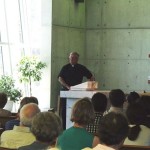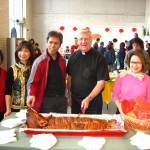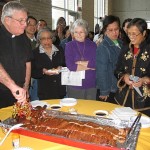I think that when we Catholics hear the word ‘church’ we think of a building. What might come to mind is a picture of St. Peter’s in Rome with its massive dome that dominates the city of Rome. But as you know the church is all about people. As I mentioned before we were church long before we had buildings. But we do get tied up in buildings, especially our cathedrals.
Just supposing years from now, maybe a few hundred years from now, you were a visitor to Rome and the must see tourist cite is the ruins of St. Peters. Just as today people visit the ruins of the Roman Forum, the heart of the ancient Roman Empire. This once beautiful church, the pride and joy of Catholics around the world is now reduced to a pile of rubble. Did the life and faith of the people of God die when this building was destroyed by whatever means. No, the life of our church went on.
In today’s gospel we hear of people boasting about the beauty of the Temple with its precious stones and expensive gifts dedicated to God. It must have been a beautiful structure. But Jesus throws cold water on their enthusiasm, ‘The days will come when not one stone will be left upon another. All will be thrown down.’ The men and women who heard these words couldn’t believe them. The temple, God’s own house will last forever. It was built on the site of Solomon’s temple built centuries before. That temple was destroyed by the Babylonians then rebuilt by the Jewish people who came back from exile in Babylon. During his reign King Herod started adding to this second Temple wanting to make it more impressive. He meant his restoration and enhancement of God’s house to be a memorial to him. But 70 years after the death of Jesus the Romans came and reduced the temple to ruins and left not one stone upon another as the Roman punished the Jewish people who revolted against them.
Important though it was to Jewish faith and ritual celebrations the faith and observance of the Jewish people did not die, it just took on another way of expressing itself. It thrives today.
If every church in the world was left with not one stone upon another our Christian faith would survived, kept alive by good people like yourselves who strive to live out your faith in God, your faith in God’s Son, Jesus the Christ. Good people like you who know that we did not choose God but that before the world began God Choose us in Christ to be God’s adopted sons and daughters. Good people like you who believe that God sent his son into the world not to condemn us but that through Jesus we might be saved. Our Christian faith survives in and through good people like you who try to love and forgive family members and neighbours and fellow workers as Christ loves and forgives you.
This has happened before. Portuguese missionaries brought Christianity to Japan in the 16th century. The Christian community thrived for about 50 years until Christianity was outlawed and a great persecution followed. A good number of the people went underground and practice their faith in secret. In 1837 freedom of religion was restored and missionaries returned. They were surprised when after a few years they were approached by some people who asked the missionaries these questions; do you believe the Pope is the head of the church and do you believe Mary is the Mother of God?
When the missionaries said ‘yes’ to these people, they said ‘we too are Christians.’ These good people became known as the hidden Christians of Japan. In those many years of hiding they camouflaged their statues of Mary and the saints to look like Buddhists god and goddesses. Because of what we might call ‘inbreeding’ and because they were cut off from the universal church, some of the truths and practises of the faith became distorted but they still saw themselves as real Christian Catholics and many were gradually brought back to the church. The original hidden Christians have pretty well died out. But those dedicated good people kept the faith alive.
If the time comes when in the present reality of our church ‘one stone is not left upon another the church will survive because each Christian is, as St. Peter teaches, like a living stone built into a spiritual house, to be a holy priesthood. St. Paul tells us that the foundation of this spiritual structure is the teachings of the apostles and prophets with Jesus Christ as our corner stone. It is Jesus Christ who holds the spiritual structure together so that we can grow into a holy temple in the Lord, a dwelling place for our God.
As we continue to celebrate this Mass, as living stones of this spiritual structure, we pray that each one of us, through the work we do, the prayers we pray and the service we give, always do our part, by God’s grace to be true living stones in the structure of the church.
 Founded by St. Paul of the Cross, every Passionist takes a special vow to spend his or her energies in promoting remembrance of the sufferings of Jesus, the memory of the Cross, and reflection of the meaning of the Cross for the world.
Founded by St. Paul of the Cross, every Passionist takes a special vow to spend his or her energies in promoting remembrance of the sufferings of Jesus, the memory of the Cross, and reflection of the meaning of the Cross for the world.




